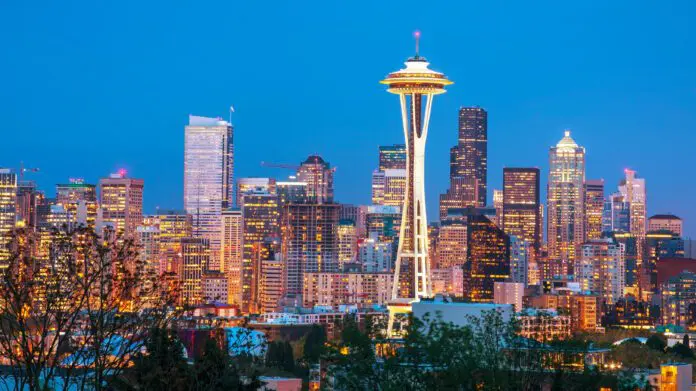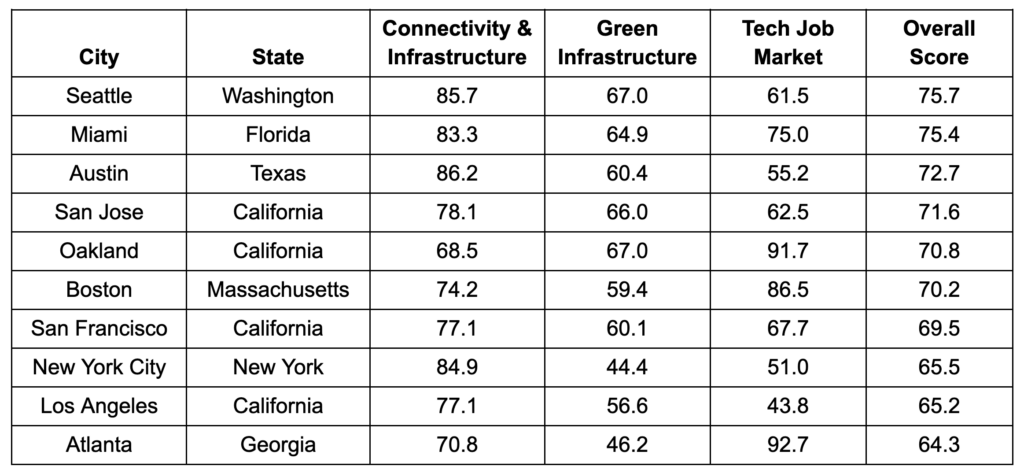
By James Blackman June 7, 2024
Collected at : https://www.rcrwireless.com/20240607/fundamentals/the-top-10-smart-cities-in-the-us
Whatever happened to the concept of ‘smart cities’? We used to write about them all the time, but the whole discipline seems to have splintered in recent years into a myriad of public and private urban smart-infrastructure sub-sectors, mostly covering the creeping modernisation of the built environment, transportation systems, and the distribution of sundry utility services. Most centralised municipal interest is about digital engagement and data governance, and work with the private sector to support the rest – plus some IoT for smart parking and smart bins.
But Swedish real-estate tech company ProptechOS, which sells a management platform for smart-building applications, has run the rule over the biggest cities in the US and Europe, and ranked them against a set of criteria proposed by the Organisation for Economic Co-operation and Development (OECD) for judging civic ‘smartness’. In all, it analysed 16 equally-weighted metrics (on a 0-100 scale) across three categories: connectivity and infrastructure, environmental sustainability, and the local tech job market.
The analysis – of the 48 largest cities by population in the US, and 23 European capitals with comparable data – was conducted last month (April 2024). And the results are now in, with cities ranked by their total score across the 16 measures, and flagged also for their performance in each of the three OECD categories. And the scores are in. They suggest that, in the US, the smartest city of them all is Seattle, in Washington State, which beats Miami in Florida (in second) and Austin in Texas (third). Austin won the bout last time out, said ProptechOS.
San Jose, Oakland, Boston, San Francisco, New York City, Los Angeles, and Atlanta, round-out the top 10, as below. Seattle, home to Amazon and Microsoft, scored 75.7 out of 100 overall. It scored well (second highest) for tech infrastructure (85.7/100), counting 34 AI companies and 13 IoT companies “per 100,000 people”, said ProptechOS. The review of tech infrastructure included eight measures: free Wi-Fi hotspots, broadband speeds, 5G coverage, AI companies (in total and per capita), IoT companies (in total and per capita of 100,000), and also how many airports.

Seattle scored highest (of the top 10) for green infrastructure, increasing tree coverage by 13,700 hectares between 2010 and 2020, and building the equivalent of 10 electric vehicle (EV) charging points per 100,000 people, apparently. Green infrastructure was measured on six counts: particle pollution (PM2.5) and air quality, tree loss, tree gain, EV charging points (in total and per capita), and LEED-certified green buildings.
But Austin (86.2/100) ranked highest for connectivity, and Kansas City (which does not feature in the top 10 at all) ranked highest for sustainability. Austin scored well for its broadband speeds (275.60 Mbps, on average, versus 217.14 Mbps for the whole country), and its AI bustle (“337 AI companies, the equivalent of 35 per 100,000 people”). Kansas City’s green card looked good (77.8/100) mostly because it has lots of parkland (12,000 acres), and a busy tree-planting policy (5,730 hectares of tree cover over the last 10 years; 10,000 more trees within the next three).
The air is ‘good’ in Kansas City, too – which is something of a rarity in the US, where only 30/48 cities can say the same. It also does well for EV charging points. Meanwhile, Washington DC ranked highest in the US for tech jobs – a category that was scored on the number of jobs advertised, in total and per capita (again, per 100,000). At the time of the poll, ProptechOS reckoned there were 50,203 tech jobs listed in the city, equivalent to 794.7 jobs per 100,000 people. It is home to around 16,000 tech companies, apparently. Atlanta, Georgia, also scored well for its job market.
Erik Wallin, founder and chief ecosystem officer at ProptechOS, commented: “Cities adapting to greener ways of living are set to thrive… Embracing sustainable practices endorsed by global leaders is essential. The United Nations views smart infrastructure as crucial for urban growth. Advancements in smart cities and future technologies such as next-generation wireless communication and artificial intelligence are expected to reduce environmental impacts and enhance living standards.”
A summary of the European results can be found here.

Leave a Reply